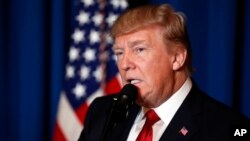The largest U.S. Muslim civil rights and advocacy organization is expressing hope the U.S. military strike in Syria is signaling a reversal of President Donald Trump’s stance on banning U.S. entry to people from six majority-Muslim countries, including Syria.
Trump, who was viscerally moved by footage of an apparent chemical weapons attack in Syria on civilians, including women and children, ordered a missile attack on Syria in retaliation.
The Council on American-Islamic Relations (CAIR) said the U.S. “must lead an international effort” to establish no-fly zones and safe-zones for civilians” in Syria. The group wants the U.S. “to impose economic and diplomatic sanctions on any individual, group or government that has a role in the continuing genocide” in Syria.
Congress wants clear policy
U.S. politicians, meanwhile, have supported Trump’s move in Syria, but have cautioned that going forward, the president must have a plan and must work with Congress.
House Speaker Paul Ryan said the U.S. action in Syria was “appropriate and just,” but he is looking forward “to the administration further engaging Congress in this effort.”
House Foreign Affairs Committee Chairman Ed Royce said Syrian President Bashar al-Assad was “caught red-handed” carrying out an “abhorrent chemical attack.” Royce said the Trump administration “must work with Congress and lay out clear policy goals for Syria and the region.”
U.S. Senator Chris Coons, an opposition Democrat and member of the Senate Foreign Relations Committee, said images of the Syrian children and adults “who were brutally murdered and poisoned by their own government were not only heartbreaking and horrifying, they were a call to action for the global community.”
“While I’m encouraged that the Trump Administration has felt compelled to act forcefully in Syria against the Assad regime, I’m gravely concerned that the United States is engaging further militarily in Syria without a well-thought-out comprehensive plan.” Coons urged Trump “to work with Congress to address the ongoing crisis in Syria and to seek proper authorization for further use of military force.”




